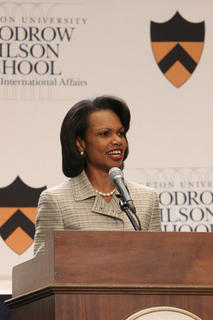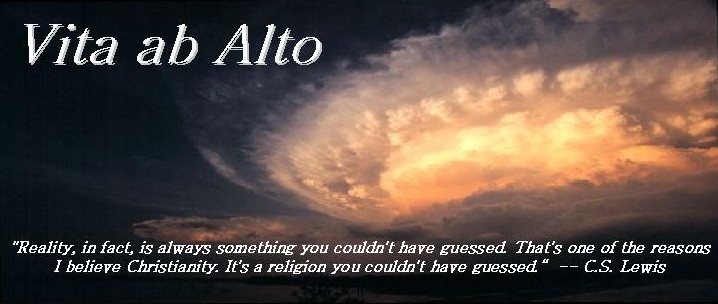Extraordinary Times

Secretary of State Rice delivered an important statement of policy and perspective yesterday at Princeton's Woodrow Wilson School of Public and International Affairs [the full video is available here]. It was cogent and powerful, and expressed an appropriate reminder to keep our wits about us and appreciate the larger historical perspective that today's seemingly chaotic events may well be part of:
...Let us be very clear about exactly who they and we are fighting. Some of the insurgency is fueled by the same thugs and henchman who enforced Saddam Hussein’s tyranny for decades. They fight now to regain the unjust privileges they once had. There are many others, however, foreign terrorists like Abu Musab al-Zarqawi, who seek to ignite the very civil war that ordinary Iraqis are trying so hard to prevent.
These terrorists target Iraqi children receiving candy from American soldiers. They line up schoolteachers and execute them in their classrooms. They murder hospital workers caring for the wounded. And they massacre innocent Muslims who want to serve as policemen and soldiers and government officials in the new Iraq. This is not some grassroots coalition of national resistance. These are merciless killers who want to provoke nothing less than a full-scale civil war among Muslims across the entire Middle East. And having done so, they would build an empire of terror and oppression.
The choice we face in Iraq is, thus, stark. If we quit now, we will abandon Iraq’s democrats at their time of greatest need. We will embolden every enemy of liberty and democracy across the Middle East. We will destroy any chance that the people of this region have of building a future of hope and opportunity. And we will make America more vulnerable. If we abandon future generations in the Middle East to despair and terror, we also condemn future generations in the United States to insecurity and fear.
Ladies and Gentlemen: We have set out to help the people of the Middle East transform their societies. Now is not the time to falter or fade.
I know that this vision can seem very distant at times, especially when we see so many tragic images of death, of innocent Iraqis and Afghans, and of course, Americans dying overseas. There are legitimate differences about the war we are now fighting in Iraq and in a great democracy like ours, everyone has the right to express those views freely.
But I hope that we can all step back and look at other extraordinary times and though they are not perfectly parallel, they can help us to gain a perspective on the challenges we face.
In 1989, I was lucky enough to be the White House Soviet specialist at the end of the Cold War. It doesn't get any better than that. I was there for the liberation of Eastern Europe; the unification of Germany; and for the beginnings of the peaceful collapse of the Soviet Union itself. I saw things that I never thought possible. And one day, they seemed impossible; and several days later, they seemed inevitable. That is the nature of extraordinary times.
But as I look back now on those times, I realized that I was only harvesting the good decisions that had been taken in 1947, in 1948, and in 1949. And sometimes, I wonder how in the course of events, the course of the moment, people like Acheson and Truman and Marshall and Vandenberg saw a path ahead. After all, in 1946, the Germany Reconstruction was still failing and Germans were still starving. Japan lay prostrate. In 1947, there was a civil war in Greece. In 1948, Germany was permanently divided by the Berlin Crisis; Czechoslovakia was lost to a communist coup. And in 1949, the Soviet Union exploded a nuclear weapon five years ahead of schedule; and the Chinese communists won their war. In 1950, a brutal war broke on the Korean Peninsula.
These were not just tactical setbacks for the forward march of democracy. Indeed, it must have seemed quite impossible, that we would one day, stand at a juncture where Eastern Europe would be liberated, Russia would emerge, and Europe would be whole and free and at peace. If we think back on those days, we recognize that extraordinary times are turbulent and they are hard. And it is very often hard to see a clear path. But if you are -- as those great architects of the post-Cold War victory were -- if you are true to your values, if you are certain of your values, and if you act upon them with confidence and with strength, it is possible to have an outcome where democracy spreads and peace and liberty reign.
Because of the work that they did, it is hard to imagine war in Europe again. So it shall be also for the Middle East.
This is exactly the sort of thing the White House needs to be doing more of. And it needs to somehow make the public aware of these statements. The traditional media won't cover this kind of thing: they're hostile to the Administration's intent. It is up to independent, non-traditional media to help spread the word.
Read the whole thing.
Monk



